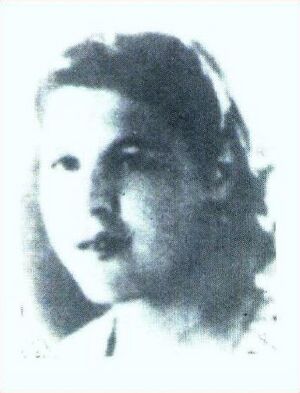Stefanina Moro facts for kids
Quick facts for kids
Stefanina Moro
|
|
|---|---|
 |
|
| Born | 1927 Genoa, Italy
|
| Died | October 9, 1944 (aged 16–17) Asti, Italy
|
| Burial place | Genoa |
| Monuments | Via Stefanina Moro in Genoa |
| Occupation | Courier, Italian resistance movement |
Stefanina Moro (born in 1927, died October 9, 1944) was a brave Italian girl. She was a partisan during World War II. This was when Nazi Germany occupied her country. Stefanina worked as a courier, carrying important messages. She was captured by Nazi soldiers and sadly died from her injuries.
Contents
Stefanina's Life Story
Stefanina was born in Genoa, a city in Italy, in 1927. She lived in a part of Genoa called Quezzi. During the war, Italy was fighting to become free from Nazi control. This was called the war of Italian liberation.
Her Role as a Courier
Stefanina was a staffetta, which means a courier. Her job was very important. She carried messages between different groups of partisans. These messages helped the resistance fighters stay connected and plan their actions.
Capture and Bravery
In 1944, when Stefanina was still a teenager, Nazi soldiers arrested her. They took her to different places, including a building in Genoa that the Nazis used as a prison. Here, they tried to make her tell them the names of her friends and other partisans.
Stefanina was very brave. Even though she was hurt, she never told them anything. She kept the secrets of her allies safe.
Her Final Days
After being held by the Nazis, Stefanina was taken to a hospital in Asti. She died there on October 9, 1944, because of her injuries. She was only 17 years old.
Remembering Stefanina
Stefanina Moro is remembered as a hero in Italy. Her courage helped the resistance movement.
Memorials and Tributes
Her name is on a special memorial in Quezzi. This memorial honors everyone from that area who died fighting the Nazi occupation. The words on it say: "They did not fall in vain but for freedom."
The city of Genoa also named a street after her. It is called Via Stefanina Moro. A plaque on the street says: "Via Stefanina Moro – Fallen for freedom – 1927–9/10/1944."
Honored by Leaders
In April 2020, Italy celebrated the 75th Anniversary of Italy's Liberation. On this day, a government official named Sandra Zampa spoke about the brave women of the Resistance. She mentioned Stefanina Moro, along with other important partisans like Nilde Iotti and Irma Bandiera. Stefanina's story continues to inspire people today.
 | Anna J. Cooper |
 | Mary McLeod Bethune |
 | Lillie Mae Bradford |

